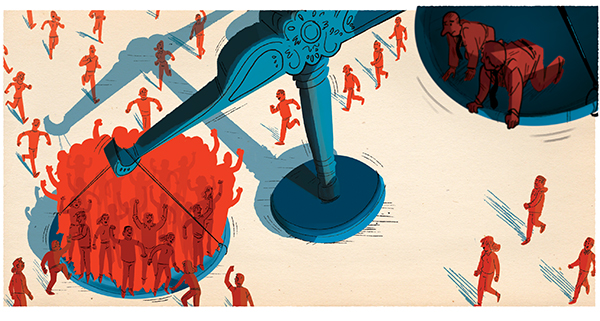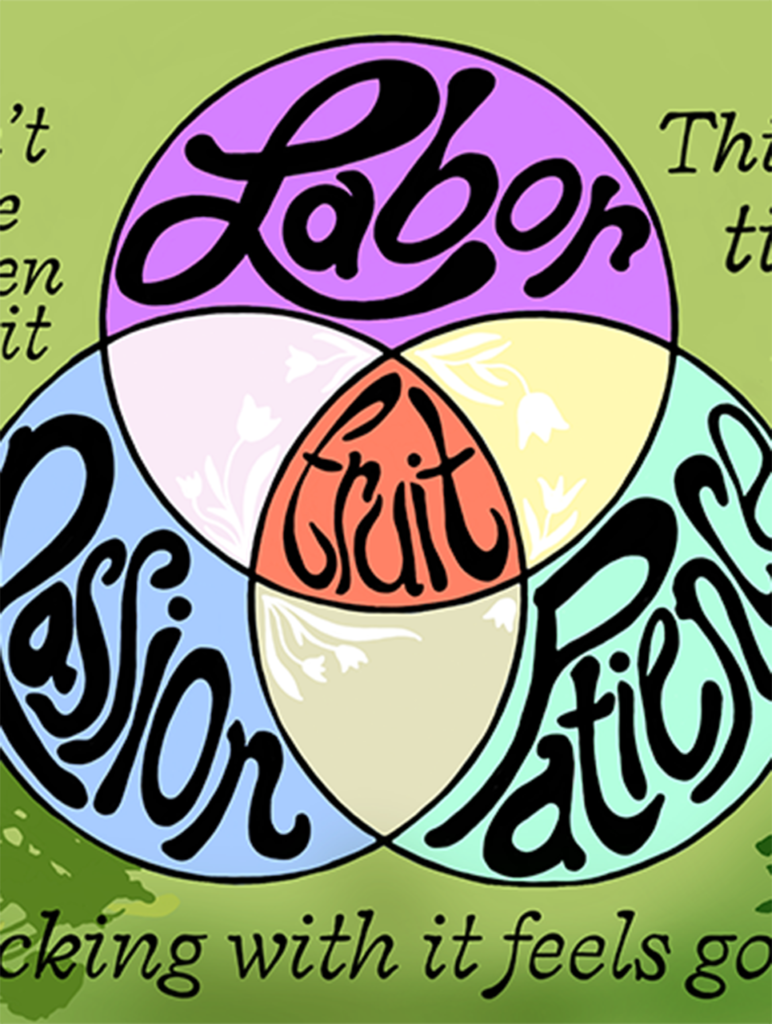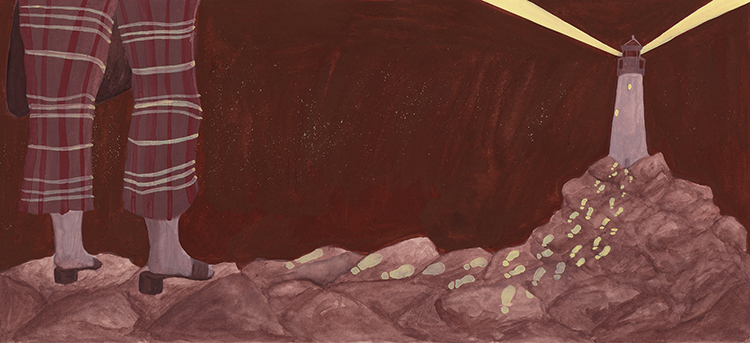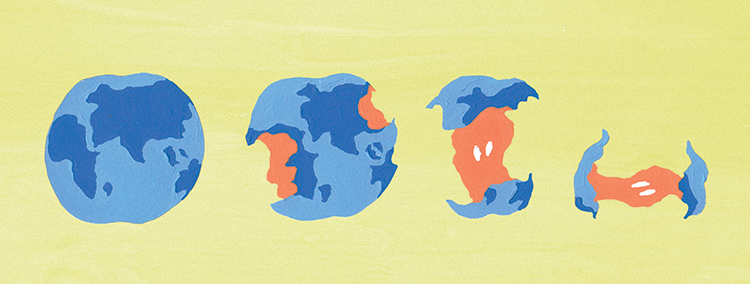Illustration by Bart Browne
The Case for a Moral Economy
by Lina Blount
When we face the overwhelming issues of economic inequality and injustice, oftentimes the available solutions seem either exclusively consumer-based or incredibly small scale. We buy local food and fair trade coffee. We join a local co-op with no vision for how to influence our city, region and nation. These choices may be good, but we must think bigger.
How can we create wealth for more people by providing a living-wage economy? How can we keep wealth in communities? How can we create jobs that lift up the values we hold—like investing in schools and not prisons, and creating energy jobs that don’t endanger our future and our planet? In order to achieve this vision at scale, we can learn from Gandhi’s model of constructive programs and resistance programs—leveraging the power of nonviolent direct action and grassroots people power to challenge the existing system, while heading toward large-scale alternatives.
We know that mass, nonviolent direct action movements can shift policy faster than advocacy alone. Consider that in the early 2000s, progressive advocates and politicians were fighting to raise the national minimum wage just a few quarters. Hardly a decade later, the grassroots “Fight for $15” movement changed entirely what we believe to be politically possible through a series of nonviolent, coordinated local campaigns. As a result, working people around the country are closer than ever to earning a living wage.
The creation of co-op networks—from Mondragon in Spain, to Cleveland, to Philadelphia—demonstrates how we can find scalable ways to keep wealth in our neighborhoods. For example, the Philadelphia Area Cooperative Alliance (PACA) is working to support 20 study circles to start 20 new regional co-ops, businesses that are owned collectively by people who live in the community, not far away corporations. PACA is introducing a replicable “co-op chamber of commerce” model that goes beyond a single neighborhood store and begins to get at the question of scale.
But to truly implement our vision of a more moral economy at scale, we need to continue to resist and challenge the power of those invested in our current system. There are many corporate lobbies that are doing active harm, from big banking and the gun lobby to the fossil fuel lobby.
Shaking their hold is critical to scaling up alternatives. Yes, the work of in-house advocacy plays a critical role in doing this, but as the fight for $15, the fight against the Keystone XL pipeline, and historical campaigns like the civil rights movement show, when the halls of politics and advocacy are stacked against you, grassroots movements can break the deadlock, capture public imagination, and build momentum toward making alternatives possible.
This year, at the Democratic National Convention (DNC), we saw a glimpse of what could be when the Rev. Dr. William J. Barber of North Carolina took the stage. His message has become a clarion call for organizers and people of faith across the country, and he has inspired tens of thousands of people—over 1,000 of whom were arrested—to take part in “Moral Monday” protests, picketing the legislature in his home state for what they believe to be discriminatory public policies.
Onstage at the DNC, he called for us to embrace “our deepest moral values and push for a revival of the heart of our democracy.” To heed Barber’s call is to first accept how fundamentally amoral our current economic system is. It was built on the back of slave labor and upon hundreds of years of exploitation and extraction around the world. We are scorching our planet, locked into a paradigm of short-term profit that passes on the cost of climate change to future generations. The top 0.1 percent of Americans are taking in over 184 times the income of the bottom 90 percent, and families of color have 16 times fewer assets than their white counterparts. We have gone so far as to criminalize poverty and to endure daily fearmongering about immigrants and refugees.
All of these injustices are a threat to our common good and to true democracy. No matter what the outcome of our nation’s election, we must continue the work toward Barber’s vision. We cannot stand by and accept any political or economic system that fails to meet our basic human needs, profits off of inequality and racism, or invests in endless growth despite limited planetary resources.
After we’ve acknowledged where we’ve come and the morass in which we currently stand, we must think—at scale—about how to implement a just, moral economy.
Lina Blount is the communications and outreach coordinator for Pendle Hill, a Quaker study, retreat and conference center. From Dec. 1 through 4, Pendle Hill will host the Visioning and Creating a Moral Economy conference, which is open to the public and is co-sponsored by the Quaker Institute for the Future, New Economy Coalition and the Philadelphia Area Cooperative Alliance.







